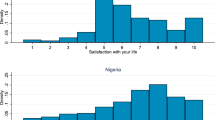Abstract
This paper proposes relative and absolute measures of deprivation using social satisfaction functions. The relative (absolute) measure gives us the amount by which social satisfaction can be increased in proportional (absolute) terms by redistributing incomes equally. We also demonstrate the existence of a relationship between summary indices of deprivation (including the Gini coefficient, the maximin index, the coefficient of variation and their absolute counterparts) and social satisfaction.
Similar content being viewed by others
REFERENCES
Amiel, Y. and Cowell F.A. (1994) Inequality changes and income growth, in W. Eichhorn (ed.) Models and Measurements of Welfare and Inequality, Springer Verlag, Berlin/New York, 3-27.
Atkinson, A.B. (1970) On the measurement of inequality, Journal of Economic Theory 2(3): 244-263.
Berrebi, Z.M. and Silber J. (1985) Income inequality indices and deprivation: a generalization, Quarterly Journal of Economics 100(3): 807-810.
Chakravarty, S.R. (1990) Ethical Social Index Numbers, Springer Verlag, Berlin/New York.
Chakravarty, S.R. (1997) Relative deprivation and satisfaction orderings, Keio Economic Studies 34(2): 17-31.
Chakravarty, S.R. and Chakraborty A.B. (1984) On indices of relative depriva-tion, Economics Letters 14(3): 283-287.
Chakravarty, S.R. and Chattopadhyay N. (1994) An ethical index of relative deprivation, Research on Economic Inequality 5: 231-240.
Chakravarty, S.R., Chattopadhyay N. and Majumder, A. (1995) Income inequal-ity and relative deprivation, Keio Economic Studies 32(1): 1-15.
Hey, J.D. and Lambert P.J. (1980) Relative deprivation and the Gini coefficient: Comment, Quarterly Journal of Economics 95(3): 567-573.
Kakwani, N.C. (1984) The relative deprivation curve and its applications, Journal of Business and Economic Statistics 2(3): 384-405.
Kolm, S.C.: (1976) Unequal inequalities I', Journal of Economic Theory 12(3): 416-442.
Paul, S. (1991) An index of relative deprivation, Economics Letters 36(3): 337-341.
Rawls, J. (1971) A Theory of Justice, Harvard University Press, Cambridge.
Runciman, W.G. (1966) Relative Deprivation and Social Justice, Routledge, London.
Stark, O. and Yitzhaki S. (1988) Labour migration as a response to relative deprivation, Journal of Population Economics 1(1): 57-70.
Takayama, N. (1979) Poverty, income inequality and their measures: Professor Sen's axiomatic approach reconsidered, Econometrica 47(3): 747-759.
Temkin, L. (1986) Inequality, Philosophy and Public Affairs 15(1): 99-121.
Yitzhaki, S. (1979) Relative deprivation and the Gini coefficient, Quarterly Journal of Economics 93(2): 321-324.
Author information
Authors and Affiliations
Rights and permissions
About this article
Cite this article
Chakravarty, S.R., Mukherjee, D. Measures of Deprivation and their Meaning in Terms of Social Satisfaction. Theory and Decision 47, 89–100 (1999). https://doi.org/10.1023/A:1005086804195
Issue Date:
DOI: https://doi.org/10.1023/A:1005086804195




